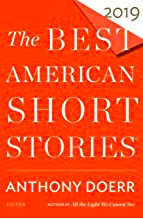
This story was featured in The Best American Short Stories 2019, edited by Anthony Doerr
The Opening
Therese
Julia found it in a pile of old stuff. She didn’t want it so she said she would give it to Therese.
I love this as an example of starting in medias res. We dont know what it is of who they are, but THEY do.
In medias res means in the middle of things but it doesn’t necessarily mean a car chase or a fight. In the middle of a conversation where the participants know their world better than we do, counts too.
Continue reading “[Reading Room] The Third Tower by Deborah Eisenberg”
